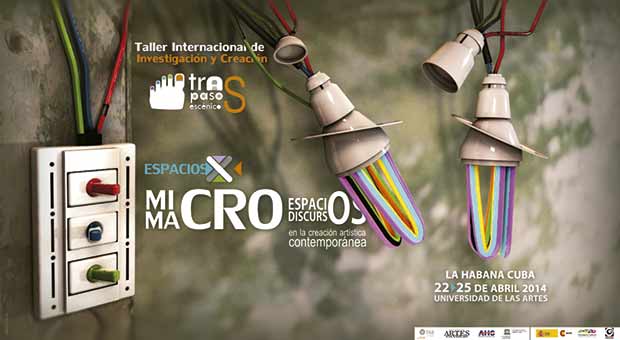The “Traspasos Escénicos” International Workshop on Research and Creation has become the perfect space for Cuban and artists and specialists to reflect on creative practices and relations in the current theater not only from art in the stage but also from audiovisuals, design, plastic arts, literature, philosophy, aesthetics and distribution processes. This is the second edition of the event which will be attended by personalities from eight countries. Itwill have workshops, colloquiums and samples on the topic of X Spaces: Micropoetics and macrospeech in contemporary artistic creation. We talked with Eberto García (Head of the department of Theater and Dramaturgy and General Director of Traspasos Escénicos), who gave us an update on the activities of the workshop and the means for foreigners to exhibit their projects in forthcoming editions.
How did this initiative emerge?
Traspasos Escénicos emerged as an idea to go beyond the usual scenarios we move in. We named the project like that not only aiming at that but also at stressing that we all build the stages where we perform and modify the circumstances in our life, where we interact in many different ways and those spaces are precisely the focus of analysis in the event. How to create such spaces? How to create different strategies for achieving more open and balanced social relations in accordance with current circumstances? How to create synergies and projects so that people can exchange their experiences and knowledge and open to the world to every idea that might generate? These are some of the starting points of the event.
Why the need to dialogue on Micropoetics and macrospeech in contemporary artistic creation?
When we first thought about the topic of the event we had a brainstorm. Some proposals started to be shaped from the experiences from last year’s event. There were really interesting and polemic debates on each idea about what to do in each scenario and on how the relations with spectators, teachers, students, and researchers in these tiny spaces for creation and trainingchange and generate diverse dynamics with multiple social repercussions which we are not 100% aware of. That’s what placed us in the search for proposals and so have emerged projects linked to the cinema, literary and visual arts speech,etc.
What has been the response of the call for the project?
We are pleased because the national and international response has been amazing. We have always had in mind discrete projects given our work conditions. However, the first time we launched the call for the project the interest of the audience and speakers took us by surprise. Our event was held in parallel with Havana’s Biennial at the Higher Institute of the Arts (ISA by its acronym in Spanish) and despite that we had a strong and heterogeneous audience, which has become a community of people with common interests with whom we systematically interact.
Thinking in future editions of this Workshop, what’s the procedure for foreigners to take part in the event?
We have this email: ebertocuba@cubarte.cult.cu, through it we make the connections. The work dynamics in Traspasos Escénicos are similar to a social network, though we are not one because we lack the technology, but from there we can share and spread experiences and information from hand to hand. We are open to new projects. We try to establish a dialogue between the proposals we receive from other nations and the ones we have in Cuba. That’s the purpose of sharing our actions and our stages.
What’s the program for Havana’s theaters during the event?
We work with groups that will stage pieces that later on will contribute with the development of workshops. In this regard, we have arranged performances by groups such as La isla secreta, with the play Oración; Teatro el Público, directed by Carlos Díaz will continue with Antigonón. These plays are the starting point for two Brazilian professors, who participated in the first edition of the event, to carry out a performance workshop on the poetics of spectators. El Portazo, a group from the western province of Matanzas, led by Pedro Franco, will revive Semen (April 22l, 6 p.m Miramar Theater), by Yunior García. This group is inserted in the workshop not only from the aesthetic perspective but also taking into account the way these actors manage and promote their work. Brazilian André Carreira arrives with Experiencia Subterránea and a version of Women’s, with script by Daniel Veronese, (April 24, 6 p.m Miramar Theater). The leading actresses will also be part of a workshop of the event. Moreover, Carlos Celdrán, also participating in the workshop,and Argos Theater will premiere the piece El tiovania, a version of a Czech classic play. The Cuban Center for the Promotion of Humor will perform as well (April 25, 5 p.m ISA) and the closing of the event will be in charge of a special presentation by Ópera de la Calle, a company directed by Ulises Aquino with the show 1959. This performance will be open for the audience on April 25 at 6 p.m. at ISA.
Around these days the audience will be able to go to the theater, work in workshops, participate in colloquiums… so, Traspasos Escénicos is not about isolating but rather sharing experiences that can be interconnected from creative and training processes.










